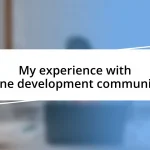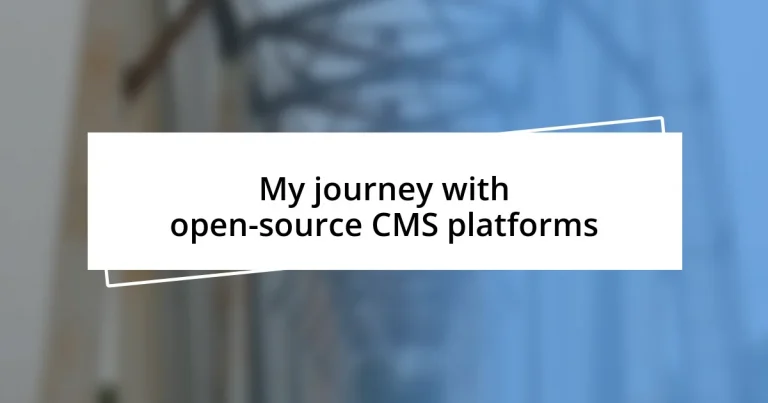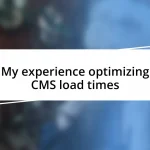Key takeaways:
- The journey of using open-source CMS platforms like WordPress highlights the excitement of customization, community support, and shared knowledge, fostering creativity and empowerment.
- Contributing to open-source projects, even in small ways, leads to personal fulfillment and a sense of belonging within a supportive global community.
- Challenges such as plugin compatibility, security concerns, and content management emphasize the importance of strategic planning and utilizing community resources for effective CMS use.
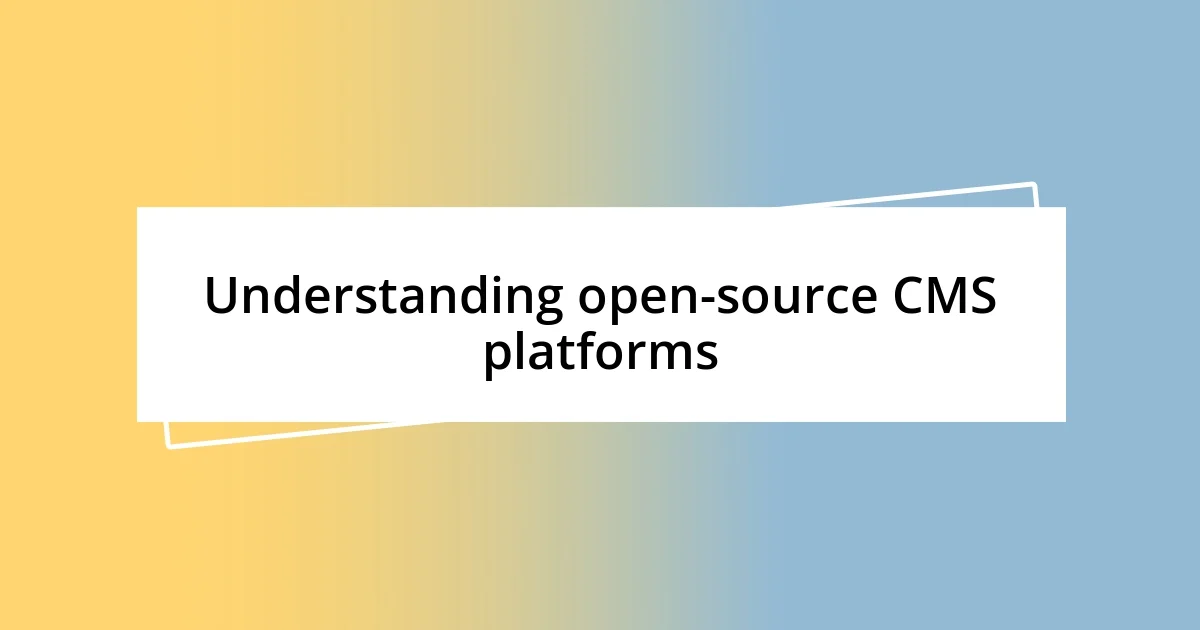
Understanding open-source CMS platforms
Open-source CMS platforms are fascinating because they offer a level of flexibility and customization that proprietary systems often lack. I remember my first encounter with WordPress—a sense of liberation washed over me as I realized that I could tweak themes and plugins to fit my vision without breaking the bank. Have you ever felt that spark of creativity when you discover the ability to shape something entirely your own?
The beauty of these platforms lies in their collaborative nature. I’ve often found myself amazed at the vibrant communities surrounding open-source projects. These communities can be incredibly supportive, offering everything from tutorials to troubleshooting advice. Doesn’t it feel reassuring to know there’s a network of users just like you, ready to help navigate the challenges that come with using these platforms?
Moreover, understanding the core principles behind open-source CMS platforms can be immensely empowering. When I learned about the transparency in their development, I felt connected to a broader movement promoting shared knowledge. It’s not just about building websites; it’s about contributing to a collective resource that benefits everyone. How empowering is that?
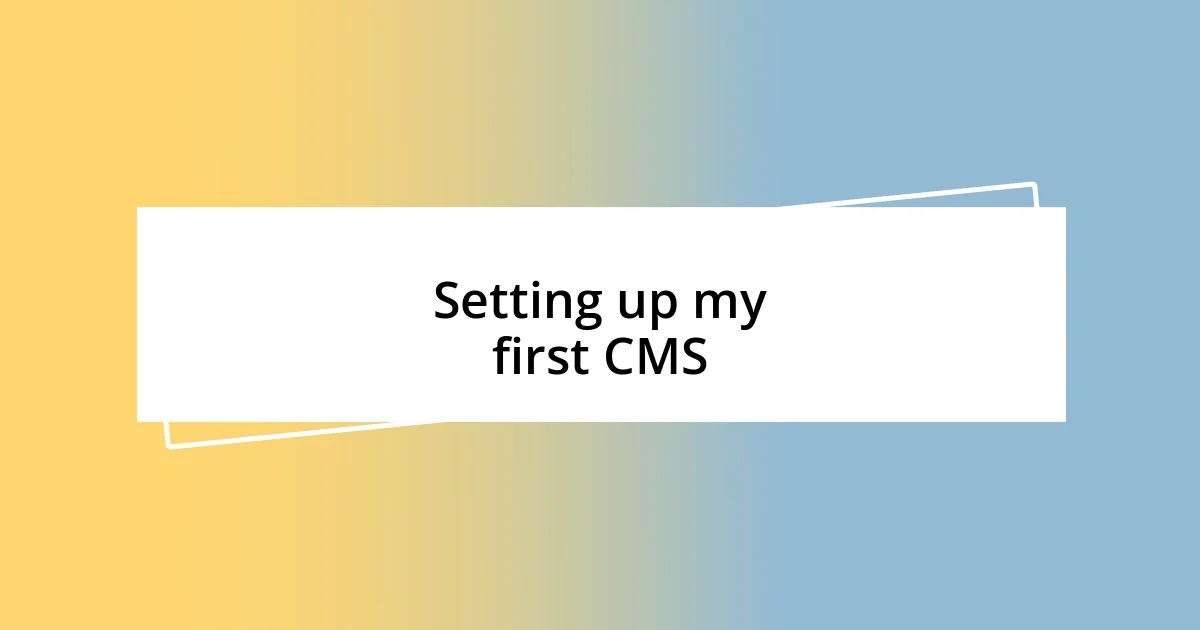
Setting up my first CMS
Setting up my first CMS was a thrilling adventure. I remember the moment I hit the “install” button on WordPress—it felt like I was unlocking a treasure chest of possibilities. Navigating the setup wizard was surprisingly intuitive, yet I knew I had to choose the right hosting provider. Each option I considered sparked a mix of excitement and anxiety. Would I be able to manage my website on this platform?
As I dove into customizing my site, I distinctly recall the mix of joy and frustration that accompanied figuring out themes and plugins. I experimented with countless designs, each click revealing new features or quirks. At times, I felt overwhelmed, but these challenges were a vital part of my learning curve. The moment I successfully implemented my first plugin, it was as if I had conquered a mountain. Have you ever experienced that sense of achievement after overcoming a tech hurdle?
The community support was another highlight during my setup journey. I quickly learned to rely on forums and user groups for advice and inspiration. These platforms were like having a thousand mentors by my side, helping me make sense of my questions. I can still remember the thrill of finding solutions to problems I thought would take me days to solve. The journey was as much about mastering the tool as it was about connecting with a community of like-minded individuals.
| Aspect | My First CMS Experience |
|---|---|
| Installation Process | Easy and intuitive with a sense of excitement |
| Customization Challenges | Joyful yet overwhelming; a learning curve |
| Community Support | Invaluable; like having a network of mentors |
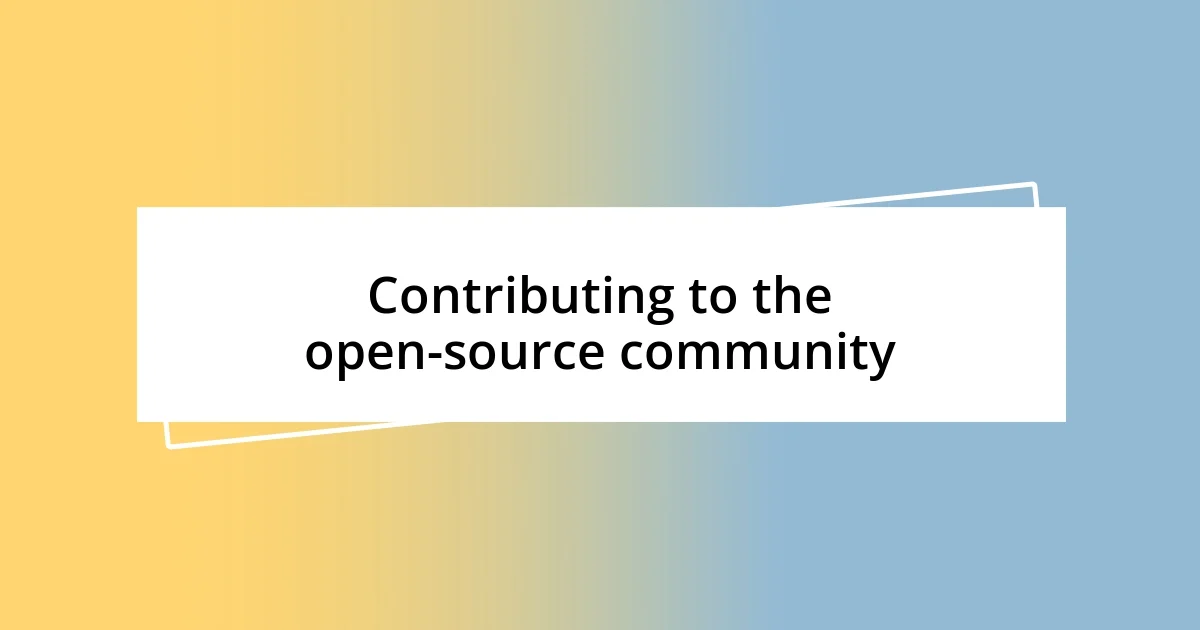
Contributing to the open-source community
Contributing to open-source projects has been one of the most rewarding experiences of my journey. I still vividly recall my first contribution—a small bug fix for a plugin I was using. The thrill of seeing my name in the contributor list was an electrifying moment. It felt like joining an incredible movement, where every effort, no matter how small, was part of a larger purpose. I realized that even the simplest contributions could have a significant impact on the community.
- You don’t need to be a coding expert to contribute; even documentation help or tutorials are valuable.
- Engage with the community on forums; sharing your journey can inspire others.
- Participate in online events or hackathons to learn and collaborate in real-time.
- Remember to give feedback on plugins and themes; your user experience is crucial for developers.
- Celebrate your milestones, no matter how small; every contribution helps shape a supportive community.
One of the most surprising aspects of contributing is the camaraderie that develops within the community. I still recall a late-night debugging session, where I ended up chatting with developers from around the globe. They shared experiences, tips, and the occasional laugh. It made me realize that open-source is not just about software; it’s about the people who create it. Being part of this global network feels like having a family that shares both challenges and triumphs, and that sense of belonging is truly priceless.
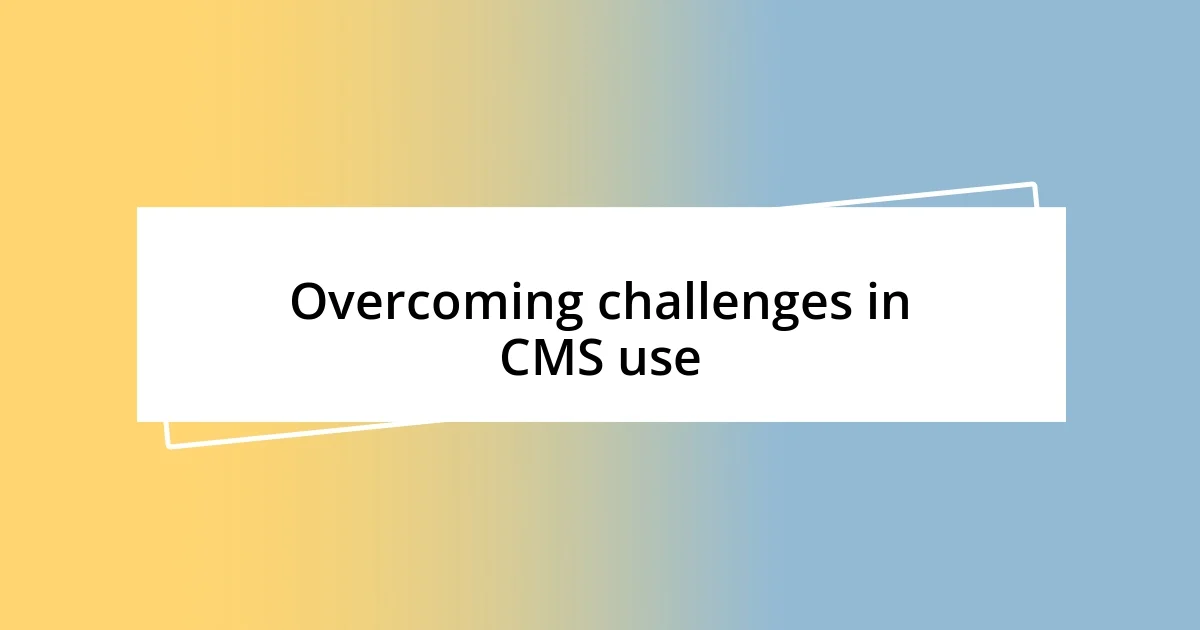
Overcoming challenges in CMS use
One of the most significant challenges I faced while using a CMS was dealing with compatibility issues between plugins and themes. There was one instance where I installed a shiny new theme only to find out that my favorite plugin no longer functioned. It felt like I had been handed a jigsaw puzzle with missing pieces. How frustrating is it when something that promised to enhance your site suddenly creates more problems? But instead of giving up, I learned to analyze plugin compatibility more carefully and plan updates strategically.
Security concerns also loomed large during my CMS journey. I vividly remember the panic I felt when I discovered my site had been targeted by a cyberattack. It was a wake-up call that taught me the importance of regular updates and strong passwords. Have you ever turned your back for a moment and felt the world collapsing around you? I certainly did. After that experience, I became vigilant, employing security plugins and even attending online workshops to enhance my knowledge on safeguarding my site.
Lastly, managing content overload was a mountain of its own. As my site grew, so did the complexity of maintaining it. I recall a time when I stared at a list of unorganized posts that felt insurmountable. It was daunting! I found that categorizing content and setting a consistent posting schedule could transform chaos into clarity. Have you struggled with maintaining order in your digital life? Implementing better planning tools and techniques not only helped me, but it made the process enjoyable, as I could see the positive changes unfold.
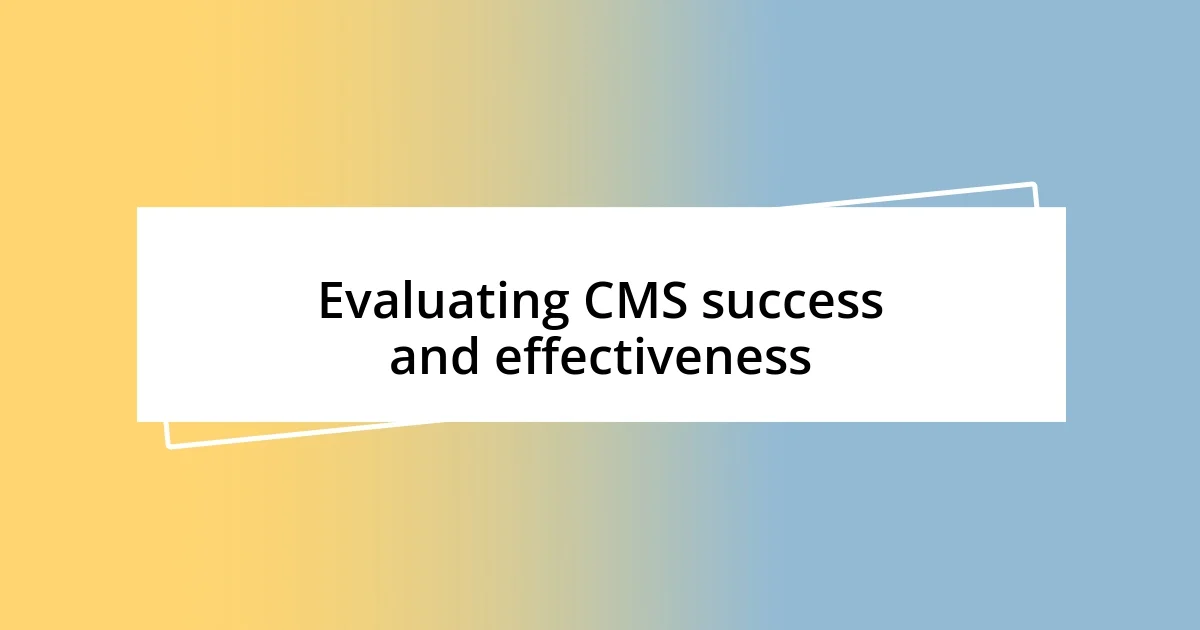
Evaluating CMS success and effectiveness
Evaluating the success and effectiveness of a CMS can feel quite overwhelming, especially given the multitude of metrics available. From my experience, user engagement is a vital indicator; I’ve seen firsthand how tracking metrics like page views and session duration provides insights into what content resonates. It’s eye-opening to realize that even small changes in layout or content can lead to significant differences in user behavior. Have you ever wondered why some pages flop while others thrive? Analyzing these patterns sheds light on the best strategies to adopt.
Another crucial consideration is the ease of use for both content creators and end-users. I distinctly remember launching a site with a complicated interface that ultimately stifled my team’s creativity. The hassle of navigating through various settings and configurations led to frustration. Simple is often better; a user-friendly CMS ensures that contributors can focus on content rather than getting bogged down with tech-related issues. Have you felt that same sense of struggle when the tools you’re using feel more like a barrier than assistance?
Lastly, I believe community support plays a significant role in evaluating a CMS’s effectiveness. During my journey, I frequently relied on forums, user groups, and online resources whenever challenges arose. There were moments where the advice I received felt like a lifeline. A vibrant community can not only provide solutions to tricky problems but also foster a sense of belonging. Have you ever tapped into communal knowledge and felt empowered by the collective experience? It’s a reminder that the success of a CMS often extends beyond its features; it’s about the people creating, sharing, and supporting one another along the way.






